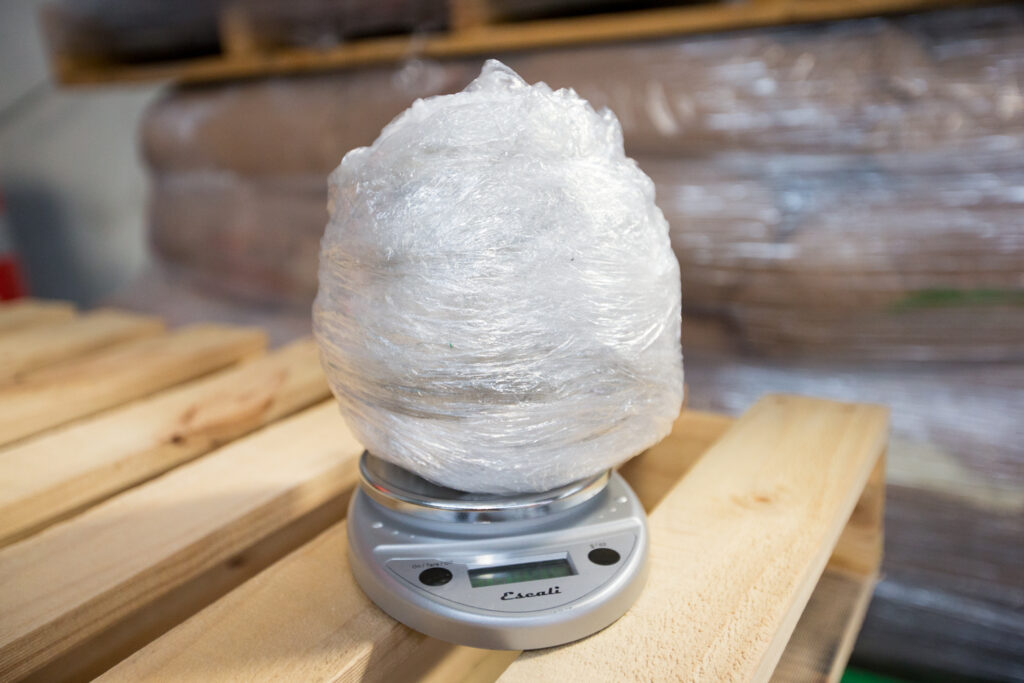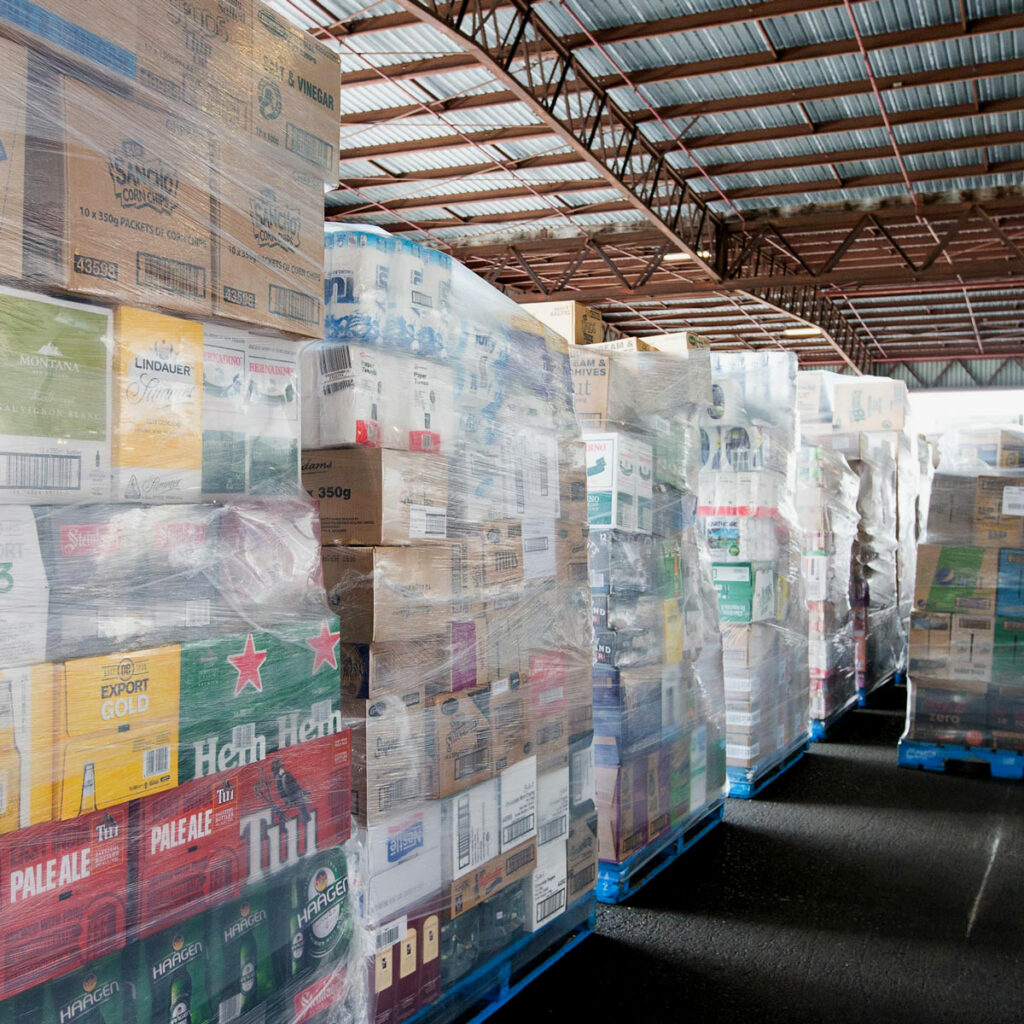Breadcrumb section
Sustainable packaging and product damage

The first two choices (but the best ones?)
Let’s be real: one of the key challenges we’re faced with is how companies can use less plastic. To do so the two main responses are to wrap pallets with less film or to transition to bio-based or biodegradable pallet films.
We always evaluate where and how these films are produced and, most importantly, whether they are actually fit for purpose.
The first of these choices, less film, can be extremely problematic and actually cost far more economically and environmentally (but more on that later). The second response must also be carefully considered before making a quick and potentially expensive change.
In research and development over the years we have been involved with testing many new pallet film products. We always evaluate where and how these films are produced and, most importantly, whether they are actually fit for purpose.
Biodegradable film is certainly helpful in minimising the impact on the environment. However, due to the lack of available facilities for proper composting, a vast majority of this wrap still ends up in the landfill. Companies wind up paying more for a product that does less.
At this stage bio-based film simply does not provide the necessary strength to work for many packaging applications. That does not mean it’s not useful in certain cases, or that it won’t one day be more effective overall. However some companies making the move to bio-based films are now having to either use far more wrap to effectively secure loads or they’re being impacted with far greater product damage.
The toll of transportation
Considerable resources have been invested globally in researching and testing how to reduce the impact of transportation of goods. From ensuring fleets are up to standard, schedules are optimised and travel time is reduced, to new technologies and innovative energy development. With these measures the overall distribution carbon footprint has been significantly reduced.
However we still believe one of the best ways to cut down on the environmental impact from transportation is to work on reducing the need for it. It’s why a key focus is always on sending products once – and once only.
More product returns equal more fuel being used on the roads, more potential landfill, more overall wastage and environmental impact.
Yet even in relatively recent research there is very little mention of product damage when considering business costs.
It is only briefly alluded to in this study, despite the key purpose of the project being “…to quantify the proportion of business costs that were attributable to transport in a number of case studies, as the basis for identifying and evaluating the opportunities for reducing those costs.”
Tracking and analysing the overall costs of damaged goods and shipping returns is difficult enough without factoring in the true environmental impact of these issues too. Yet it is vital to understand the bigger picture of transport costs and sustainability measures.

Change for change’s sake?
The appetite for change is obvious here in New Zealand. It is an idea whose time has come, and future generations will thank us for the efforts we make today in both cutting waste and protecting the planet.
Yet reactive measures are still being hastily rushed through without the necessary analysis of long-term impact. To illustrate this point (at a very basic level) we look to the favourite place of our sales team: the fridge.
“It’s like the cheese you’ve opened,” says Jed Goudie. “At first you decide to do away with the glad wrap. It’s plastic after all, and it’s better if you don’t have to use it.”
“But then someone in the family starts to cut off and throw out all the hard parts of cheese exposed to the air each time they open it up. This leads to considerable food wastage and the associated environmental costs with that.”
“So you decide to buy a new plastic container for the cheese. However this gets dropped and the lid is broken within six months. So that goes into the waste stream too – and it turns out that is a lot more plastic than if you’d just stuck with the glad wrap in the first place. Now… with all that effort, are you in a better place?”
The amount of product damage from inferior wrap in New Zealand is already too high. Good intentions can’t be allowed to stand in the way of reducing this problem.
It’s why, when it comes to effective and enduring sustainability measures, no single decision should be made in a vacuum. Careful analysis of product, packaging and process is needed.
Know before you go (and change)
We have long believed that the more that can be measured the more confidence our customers can have that their pallet wrapping is as efficient and sustainable as possible.
Here our unique SCOPE system can be ideal for larger distribution centres. This technology monitors all pallet packaging use and creates clear reporting, ensuring busy D.Cs can accurately test new pallet film before committing to change. SCOPE is also helpful for alerting when too much wrap is being used – if any set parameter is changed this is quickly discovered and fixed.
The bigger picture
Some of the key methods we’re using to enhance how our customers send securely and sustainably involve looking beyond the wrapping process too. Have a look at these three ways D.Cs can improve sustainability measures to see how small changes can make a big impact.
There are a large number of ways we can help positively affect change for New Zealand distributors too. Working with Sustainability Officers, Procurement Managers, and Operations Managers, the Universal Packaging team can carefully assess, test and improve the end of line process to ensure the right move is made.
Such was the case with our work at DB Breweries, where the adoption of Nanowrap has made a big difference – the company expecting to “reduce plastic stretch wrap usage by 30% or around 15 tonnes annually”.
We can’t often make accurate recommendations without visiting the site first however. So if you think expert analysis would benefit the sustainability measures of your packaging processes we can provide a free no-obligation site audit.
To book a visit, click here.